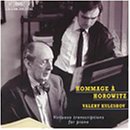| All Artists: Vladimir Horowitz, Valery Kuleshov Title: Hommage à Horowitz Members Wishing: 0 Total Copies: 0 Label: Bis Release Date: 10/30/2001 Album Type: Import Genres: Dance & Electronic, Special Interest, Classical Styles: Wedding Music, Marches, Chamber Music, Historical Periods, Classical (c.1770-1830), Modern, 20th, & 21st Century Number of Discs: 1 SwapaCD Credits: 1 UPC: 675754449025 |
Search - Vladimir Horowitz, Valery Kuleshov :: Hommage à Horowitz
 | Vladimir Horowitz, Valery Kuleshov Hommage à Horowitz Genres: Dance & Electronic, Special Interest, Classical
|
Larger Image |
CD Details |
CD ReviewsVirtuoso Transcriptions for Piano Hank Drake | Cleveland, OH United States | 07/22/2002 (4 out of 5 stars) "Vladimir Horowitz was a musician caught between two eras. At the beginning of his career, arrangements by Liszt and Busoni were still in vogue, and it was expected that touring virtuosi would treat the audience to some of their own. By the time of Horowitz' retirement in 1953, arrangements were beginning to become unfashionable, and with his return to public performance in 1965, Horowitz played fewer of his own arrangements.The art of transcribing works for piano seems to be enjoying something of a comeback these days. A number of pianists have taken to copying Horowitz' transcriptions from recordings or piano rolls (it's also no secret that printed versions of Horowitz' arrangements and original compositions have been circulating over the Internet for years). Arcadi Volodos has received a lot of publicity for this, but Valery Kuleshov is the only pianist before the public who spent time going over them with Horowitz himself. His copies of Horowitz' arrangements are accurate, and his performances of these works are mostly satisfactory. There is one piece here which doesn't quite "work," and that is Kuleshov's version of Liszt's Vallée d'Obermann. When performing this epic piece in 1966, Horowitz made some minor refinements which tightened the compositional structure and enhanced the piece harmonically--all in the authentic Liszt tradition. Kuleshov has made some further changes here. But where Horowitz' alterations clarify Liszt's intent, Kuleshov's re-workings merely come across as note-spinning.Many of Horowitz' most popular transcriptions are here, including his amplifications of Liszt's rarely played Hungarian Rhapsody No. 19, Horowitz' arrangement of the Mendelssohn/Liszt Wedding March, and, of course, the ever popular Stars and Stripes Forever. Also here is Kuleshov's version the Carmen Variations--which is an amalgamation of Horowitz' many versions of this work. Even more interesting are the recordings of Horowitz' few original compositions, the manuscripts of which are in the Horowitz Collection at Yale University. Kuleshov's is the only recording so far of Horowitz' charming Etude in E-flat, which the pianist composed as a student and apparently never performed after graduating.Kuleshov is a superb pianist blessed with a solid technique and healthy temperament. What he lacks is the demon possessed quality which marked some of Horowitz' most astonishing performances. Kuleshov, of course, has the added benefit of vastly improved recording technology, which results in finer sound and--thanks to editing--more note perfect performances than Horowitz could achieve in the days of 78-RPM, non-edited recordings. This also conveniently gathers many of Horowitz' arrangements on one disc, whereas the Maestro's own performances are scattered over several CDs from different recording companies. Horowitz composed many more transcriptions that the hour's worth here. A follow-up disc is warranted." Horowitz Transcriptions Before Volodos Alscribji | Washington, D.C. | 03/15/2007 (5 out of 5 stars) "Valery Kuleshov, a silver medalist at a recent Van Cliburn Piano Competition, does an excellent job performing original pieces and transcriptions by Horowitz. The huge splash that Volodos made with his Horowitz playing has unnecessarily, it seems, overshadowed Kuleshov and his like (e.g., Ladislav Fanzowitz). Kuleshov has a tremendous technique that brings these transcriptions to light. The only recording of Danse Macabre available is the old Horowitz one from the 1940s or 1950s. Kuleshov's recording of it takes advantage of modern-day equipment and his performance of it is spectacular! Also, the less played Liszt-Horowitz Hung. Rhap 19 is a breath-taking transcription that Kuleshov devours, completely. Some other little known Horowitz originals appear here as well such as the Waltz in F minor, Danse excentrique, and the Etude-fantasie. The recording production is top of the drawer; clear, clean, and a good sounding piano. Highly recommended!"
|

 Track Listings (10) - Disc #1
Track Listings (10) - Disc #1